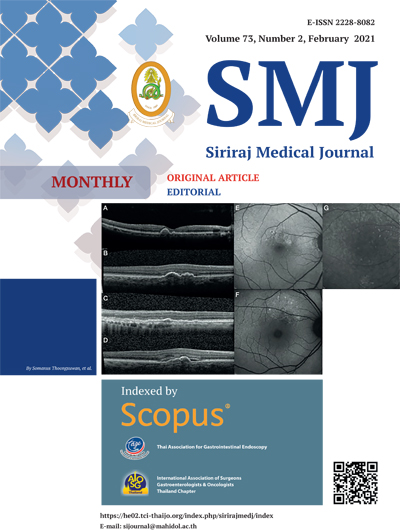Comparison of adjunctive treatment with IgM- enriched IVIG and antibiotics alone in treatment of neonatal sepsis
Comparison of IgM- enriched IVIG and antibiotics in treatment of neonatal sepsis
DOI:
https://doi.org/10.33192/Smj.2021.12Keywords:
neonatal sepsis, antibiotic, IgM-enriched IVIGAbstract
Objective: This study aimed to compare the clinical and laboratory outcomes and the mortality rate of neonatal sepsis treated with antibiotics and IgM-enriched IVIG as adjunctive therapy versus antibiotic alone. In addition, this study aimed to determine the morbidities and safety following the IgM-enriched IVIG treatment.
Materials and Methods: A retrospective cohort study was conducted between January 2016 to December 2018 in Naresuan University Hospital, Thailand. All eligible neonates were divided into 2 groups. The control group received antibiotics alone. The intervention group received both antibiotics and IgM-enriched IVIG. The clinical, laboratory parameters and morbidities were collected and compared.
Results: There were 28 neonates enrolled in the study. There were 14 in each group. In the intervention group, after receiving the 3-day course of IgM-enriched IVIG concurrently with antibiotics, the patients had significantly decreased respiratory rates (p=0.022), increased mean arterial pressure (p=0.049) and increased serum pH (p=0.017). The incidence of necrotizing enterocolitis and patent ductus arteriosus was lower in the intervention group (p=0.038 and p=0.001, respectively). No adverse effects recorded.
Conclusion: The use of IgM-enriched IVIG as adjunctive treatment showed evidence of improved outcome in the treatment of neonatal sepsis in some clinical and laboratory parameters. it also reduced morbidities in neonates presented with hypotension and DIC.
Keywords: Neonatal sepsis, Intravenous IgM-enriched IVIG, Intravenous immunoglobulin, Antibiotics
References
2. Capasso l, borrelli ac, cerullo j, pisanti r. Role of immunoglobulins in neonatal sepsis. Università degli Studi di Salerno. 2015;11:28-33.
3. Tarnow-Mordi W, Isaacs D, Dutta S. Adjunctive Immunologic Interventions in Neonatal Sepsis. ClinPerinatol 2010;37:481-99.
4. Rodriguez A, Rello J, Neira J, Maskin B, Ceraso D, Vasta L et al. Effects Of High-dose Of Intravenous Immunoglobulin And Antibiotics On Survival For Severe Sepsis Undergoing Surgery. Shock. 2005;23:298-304.
5. Kreymann K, de Heer G, Nierhaus A, Kluge S. Use of polyclonal immunoglobulins as adjunctive therapy for sepsis or septic shock. Crit. Care Med. 2007;35:2677-85.
6. Tascini C, Fraganza F, Salani F, Sozio E, Rossi M, Sbrana F et al. Potential role of IgM-enriched immunoglobulin as adjuvant treatment for invasive meningococcal disease. Intensive Care Med. 2017;44:261-262.
7. Haque K. IgM-Enriched Intravenous Immunoglobulin Therapy in Neonatal Sepsis. Am J Dis Child. 1988;142:1293-6.
8. Berlot G, Vassallo M, Busetto N, Bianchi M, Zornada F, Rosato I et al. Relationship Between the Timing of Administration of IgM and IgA Enriched Immunoglobulins in Patients With Severe Sepsis and Septic Shock and the Outcome. Surv. Anesthesiol. 2013;57:7-8.
9. Cavazzuti I, Serafini G, Busani S, Rinaldi L, Biagioni E, Buoncristiano M et al. Early therapy with IgM-enriched polyclonal immunoglobulin in patients with septic shock. Intensive Care Med. 2014;40:1888-96.
10. Al-zubaidy A, Alwan D, Athab M. Therapeutic Effect of intravenous Pentaglobulin In Treatment of neonatal sepsis. TiKrit Medical Journal. 2017;23:51-8.
11. Haque K. IgM-Enriched Intravenous Immunoglobulin Therapy in Neonatal Sepsis. Am J Dis Child. 1988;142:1293-6.
12. Kola E, Çelaj E, Bakalli I, Lluka R, Kuli-Lito G, Sallabanda S. Efficacy of an IgM preparation in the treatment of patients with sepsis: a double-blind randomized clinical trial in a pediatric intensive care unit. SEEJPH.2014.
13. Capasso L, Borrelli A, Parrella C, Lama S, Ferrara T, Coppola C. et al. Are IgM-enriched immunoglobulins an effective adjuvant in septic VLBW infants?. Riv Ital Pediatr. 2013;39:63.
14. Giamarellos-Bourboulis E, Tziolos N, Routsi C, Katsenos C, Tsangaris I, Pneumatikos I et al. Improving outcomes of severe infections by multidrug-resistant pathogens with polyclonal IgM-enriched immunoglobulins. Clin Microbiol Infect. 2016;22:499-506.
15. Laupland K, Kirkpatrick A, Delaney A. Polyclonal intravenous immunoglobulin for the treatment of severe sepsis and septic shock in critically ill adults: A systematic review and meta-analysis. Crit Care Med. 2007;35:2686-92.
16. Turgeon A, Hutton B, Fergusson D, McIntyre L, Tinmouth A, Cameron D et al. Meta-analysis: Intravenous Immunoglobulin in Critically Ill Adult Patients with Sepsis. Ann Intern Med. 2007;146:193-203.
17. Alejandria MM, Lansang MA, Dans LF, Mantaring JB. Intravenous immunoglobulin for treating sepsis and septic shock. Cochrane Database Syst Rev. 2002.
18. Neilson AR, Burchardi H, Schneider H. Cost-effectiveness of immunoglobulin M-enriched immunoglobulin (Pentaglobin) in the treatment of severe sepsis and septic shock. J Crit Care. 2005;20:239-49.
19. Norrby-Teglund A, Haque K, Hammarstrom L. Intravenous polyclonal IgM-enriched immunoglobulin therapy in sepsis: a review of clinical efficacy in relation to microbiological aetiology and severity of sepsis. J. Intern. Med. 2006;260:509-16.
20. Ohlsson A, Lacy JB. Intravenous immunoglobulin for suspected or proven infection in neonates (Review). Cochrane Database Syst. Rev. 2015.
21. Capasso L, Borrelli A, Pirozzi M, Bucci L, Alabachiara R, Raimondi F. IgM and IgA enriched polyclonal immunoglobulins reduce short term mortality in. Minerva Pediatri. 2018.
22. Salihoglu Ö, Can E, Koç MÖ, Durmus E, Hatipoglu S. Pentaglobin as an adjunct therapy in very low birthweight neonates with nosocomial sepsis. J Pak Med Assoc. 2013;63:1353-7.
23. Hamilcikan S, Can E, Buke O, Polat C, Ozcan E. Pentoxifylline and Pentaglobin adjuvant therapies for neonatal nosocomial sepsis in neonates less than 1500g weight. J Pak Med Assoc. 2017;67:1482-6.
Published
How to Cite
Issue
Section
License
Copyright (c) 2021 Siriraj Medical Journal

This work is licensed under a Creative Commons Attribution-NonCommercial-NoDerivatives 4.0 International License.
Authors who publish with this journal agree to the following conditions:
Copyright Transfer
In submitting a manuscript, the authors acknowledge that the work will become the copyrighted property of Siriraj Medical Journal upon publication.
License
Articles are licensed under a Creative Commons Attribution-NonCommercial-NoDerivatives 4.0 International License (CC BY-NC-ND 4.0). This license allows for the sharing of the work for non-commercial purposes with proper attribution to the authors and the journal. However, it does not permit modifications or the creation of derivative works.
Sharing and Access
Authors are encouraged to share their article on their personal or institutional websites and through other non-commercial platforms. Doing so can increase readership and citations.















